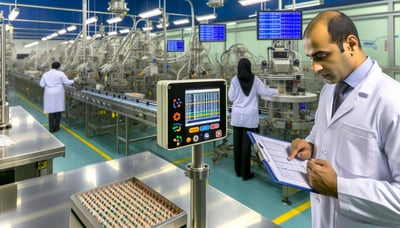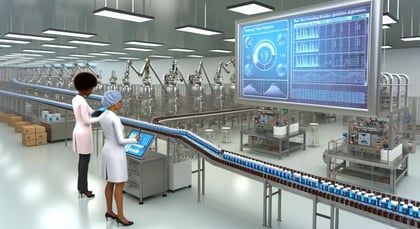Real-Time Scheduling Optimization
With stringent regulations, complex supply chains, and ever-evolving customer demands, production schedulers in pharmaceutical manufacturing facilities face immense pressure to optimize processes while ensuring quality and compliance.
In this blog, we'll look into the realm of real-time scheduling optimization and explore how integrating advanced scheduling software like PlanetTogether with leading ERP, SCM, and MES systems can revolutionize efficiency in dynamic manufacturing environments.

Challenges in Production Scheduling in Pharmaceutical Manufacturing
Production scheduling in pharmaceutical manufacturing is no simple task. From managing multiple production lines to coordinating with suppliers and distributors, schedulers must navigate a maze of variables to ensure seamless operations. Traditional scheduling methods, often reliant on manual inputs and static planning, struggle to keep pace with the dynamic nature of modern manufacturing.
Key Challenges Include:
- Rapid Changes: Sudden machine breakdowns, material shortages, or regulatory updates can disrupt schedules at a moment's notice.
- Complex Constraints: Pharmaceutical production involves numerous constraints such as equipment compatibility, batch sizes, and regulatory compliance, making scheduling a highly intricate process.
- Optimization Dilemma: Balancing production efficiency with resource utilization and meeting delivery deadlines poses a constant optimization challenge.
Real-Time Scheduling Optimization
Real-time scheduling optimization offers a solution to these challenges by harnessing the power of data analytics, machine learning, and advanced algorithms to dynamically adjust schedules in response to changing conditions. At the heart of this approach lies integration between sophisticated scheduling software like PlanetTogether and enterprise systems such as SAP, Oracle, Microsoft, Kinaxis, Aveva, and MES systems.

Benefits of Real-Time Scheduling Optimization
- Agility and Responsiveness: By continuously analyzing real-time data, scheduling software can swiftly adapt to unforeseen disruptions, minimizing downtime and maximizing throughput.
- Enhanced Decision-Making: Integrated systems provide schedulers with comprehensive visibility into all aspects of production, empowering them to make informed decisions that optimize resource allocation and prioritize critical tasks.
- Improved Efficiency: Dynamic scheduling algorithms optimize production sequences, minimize changeover times, and maximize equipment utilization, driving overall efficiency gains.
- Compliance and Quality Assurance: Real-time monitoring ensures adherence to regulatory requirements and quality standards, reducing the risk of non-compliance and product defects.
- Cost Reduction: By optimizing resource usage and minimizing idle time, real-time scheduling helps lower operational costs and improve profitability.

Integration with ERP, SCM, and MES Systems
The seamless integration between advanced scheduling software and enterprise systems is crucial for unlocking the full potential of real-time scheduling optimization. Here's how integration with leading platforms enhances efficiency and effectiveness:
SAP: Integration with SAP ERP enables seamless data exchange between scheduling software and core business processes, facilitating end-to-end visibility and alignment of production schedules with financial and procurement functions.
Oracle: By integrating with Oracle SCM Cloud, scheduling software can leverage real-time inventory and demand data to optimize production plans, synchronize supply chain activities, and enhance collaboration with suppliers and distributors.
Microsoft Dynamics: Integration with Microsoft Dynamics ERP streamlines data flows between scheduling and financial systems, enabling better resource planning, cost tracking, and decision-making across the organization.
Kinaxis: Integration with Kinaxis RapidResponse enables agile supply chain planning and execution by synchronizing scheduling decisions with demand forecasts, inventory levels, and supplier performance metrics in a single platform.
Aveva: Integration with Aveva MES provides real-time visibility into manufacturing operations, allowing schedulers to monitor equipment status, track production progress, and proactively address issues to minimize disruptions.
In pharmaceutical manufacturing, real-time scheduling optimization is no longer a luxury but a necessity for staying ahead of the curve. By harnessing the power of advanced scheduling software like PlanetTogether and integrating seamlessly with ERP, SCM, and MES systems, production schedulers can unlock new levels of agility, efficiency, and competitiveness.
Embracing this paradigm shift in scheduling is not just about optimizing operations; it's about driving innovation, delivering superior products, and ultimately, improving patient outcomes. Are you ready to take your manufacturing operations to the next level? Contact us today to learn more about how PlanetTogether can help you achieve your goals and drive success in your industry.